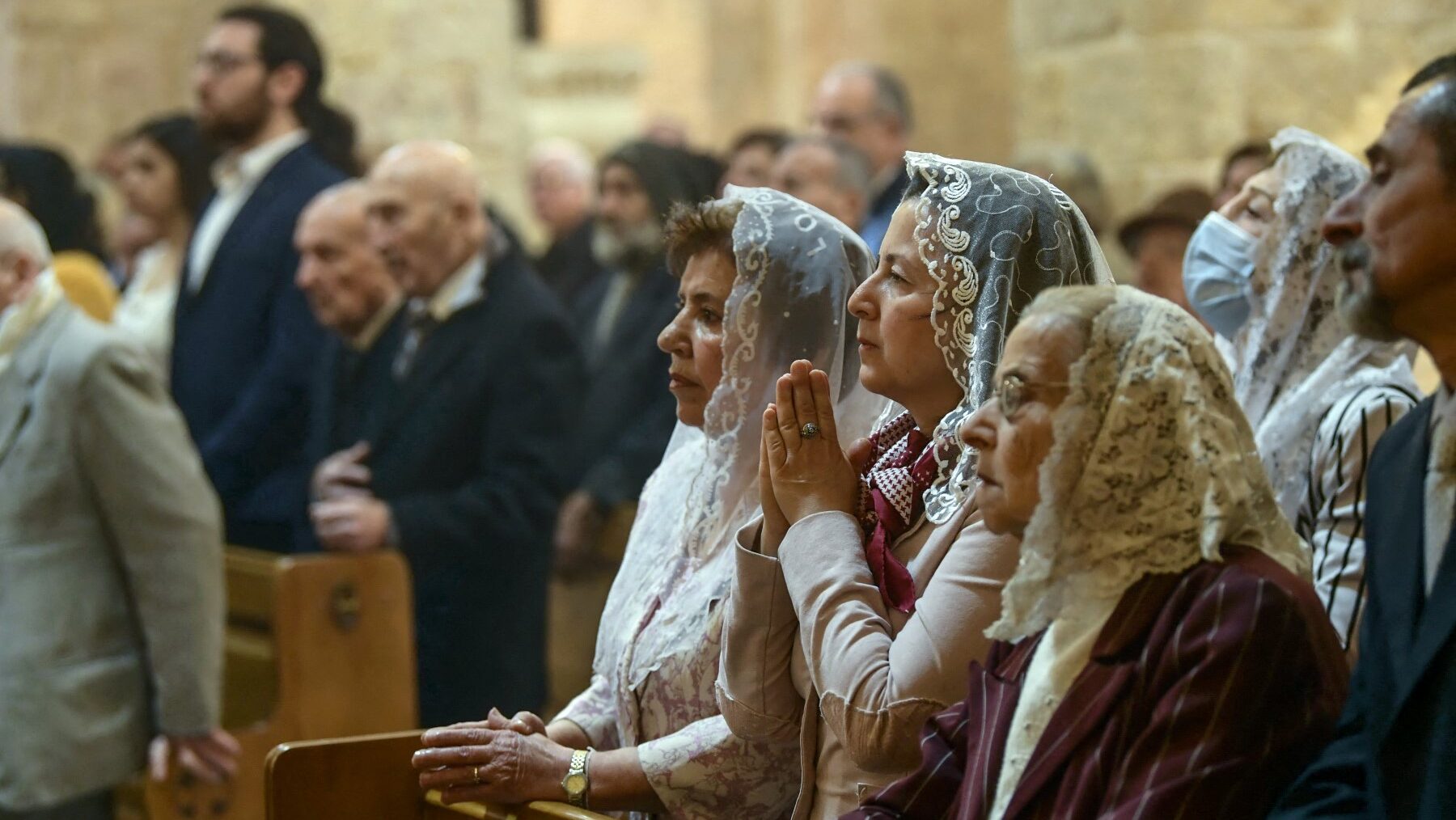
Syrian Christians attend Easter Sunday mass at the Fourty Martyrs Armenian church in the northern city of Aleppo on April 17, 2022.
Photo: AFP
Aleppo, Syria’s second-largest city, has been captured by a jihadist group as part of its offensive against the government of Bashar al-Assad. The regime lost control of the territory—for the first time since the start of the civil war in 2011—on Sunday, December 1st. This prompted fears of a new refugee crisis, while Syria’s Christians are once again likely to be the main target of the Islamist troops.
The civil war in Syria has brought several distinct forces into direct conflict: the government army, the Kurds, Daesh (a.k.a ISIS/ISIL), and a conglomerate of so-called rebel forces from the jihadist movement. One of the latter groups, Hayat Tahrir al-Sham (HTS), an offshoot of Al-Qaeda, is responsible for the capture of Aleppo.
The fall of Aleppo is inseparable from its international context. Bashar al-Assad’s government, which until recently held Aleppo, can no longer count on its traditional supporters Hezbollah, Iran, and Russia, which are engaged on other fronts. But it is also suffering from its inability to sustain the mobilisation of a population demoralised and worn down by more than ten years of war.
As Benjamin Blanchard, President of the association SOS Chrétiens d’Orient and an expert on the geopolitical and religious balances in the region, points out, the fall of Aleppo bears witness to the complex interplay of influences in Syria. In a Monday, December 2nd, interview, he told Frontières
We were told for a long time that Iran and Hezbollah had to be destroyed, but it turns out that in Syria they were the main adversaries of Daesh and Al-Qaeda. Today, their power has diminished, for better or worse.
Worse, it seems: the arrival of jihadists in Aleppo brings with them the same atrocities as their precursors—Daesh and Al-Qaeda.
Erdogan’s Turkey supports this offensive; indeed, it has made it possible. The HTS fighters do not want to stop at Aleppo and are determined to reach the Syrian capital, Damascus. For international experts, a crisis similar to that of 2015 could occur again, with a massive influx of refugees into Europe.
Kurds and Christians have everything to fear from the advance of HTS’s armed forces, whose online communications propose the systematic looting and destruction of Christian villages and the enslavement of Kurdish women.
Around 20,000 Christians still live in Aleppo and are currently risking their lives—HTS fighters are notorious for public beheadings. For the time being, local reports indicate relative calm. But Blanchard, interviewed by The European Conservative, recalls what happened a few years ago in the towns of Raqqa and Mosul. The arrival of the Islamists was not immediately followed by an explosion of violence; their persecution of Christians started later on. For a glimpse of the future, see the HTS fighters based in Idlib since 2016. For eight years, they have put Christians through hell.
Testimony from “Zerdesht,” a Syrian refugee in the Netherlands, predicts that Kurds and Christians will be the target of ethnic cleansing by the Islamist rebels who have taken Aleppo. As he explained in an interview with the Dutch media site NieuwRechts
People threatened by the jihadists would like to flee, but the jihadists won’t let them. They want to keep these groups in Aleppo so that they can be ethnically cleansed.
The HTS offensive now calls into question the usefulness of the Syrian policy pursued by European countries. For Zerdesht, despite his opposition to the Assad regime, an HTS victory would be even worse, and he condemns the benevolent attitude towards HTS fighters that can sometimes be seen in certain Western media, sometimes described as ‘rebels’ and even ‘freedom fighters.’
German migration expert and Christian Democratic Union member Ali Ertan Toprak came to a similar conclusion in an interview with the website Nius: Germany’s Syria policy has for too long been complacent towards military groups opposed to the Assad regime. He claims the federal government
has supported Sunni Islamist groups since the start of the Syrian revolt in 2011, both under Merkel and Scholz, for geopolitical interests in Syria, on the recommendation of Erdoğan, rather than democratic and secular forces.
These are the Islamist fighters who now control Aleppo.
In view of the seriousness of the situation, Hungarian Prime Minister Viktor Orbán met Syrian Orthodox Patriarch Ignatius Aphrem II in private on Monday, December 2nd, and renewed Hungary’s assurance of support for the local Christian communities—some of the oldest in the world—which are suffering persecution.
The French charity SOS Chrétiens d’Orient, which has local branches, is appealing for support for the Christians of Aleppo. The aim is to provide emergency aid to the families who have stayed behind, many of whom dare not leave their homes, but also to come to the aid of displaced people who fled Aleppo for Damascus at the last minute, between Saturday and Sunday—leaving everything behind.
